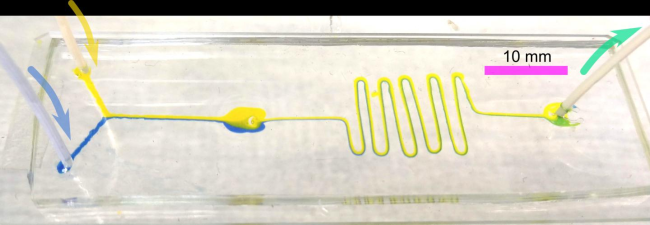
Novel AM technique cheaply fabricates rapid medical diagnostic tools
By DE Staff
Additive Manufacturing MedicalUniversity of Bristol AM process produces rapid, inexpensive lab-on-a-chip technology.

Dye-mixing inside a microfluidic chip made using 3D-printed interconnecting channel scaffolds.(University of Bristol)
“Previously, techniques for producing the soft-lithographic scaffolds/moulds (microfluidic channel patterns) were time-consuming and extremely expensive, while other low-cost alternatives were prone to unfavourable properties,” said lead author of the study, Dr Robert Hughes. “This development could put LOC prototyping into the hands of researchers and clinicians who know the challenges best, in particular those in resource-limited settings, where rapid diagnostics may often have the greatest impact.”
The University of Bristol technique employs off-the-shelf 3D printing technology to produce microchannel scaffolds with interconnecting ends that allow complex microfluidic systems can be quickly configured before it is embedded in polydimethylsiloxane (PDMS) to produce an imprint of the microfluidic configuration. The resulting PDMS microchannels efficiently operated within the typical working pressures of commercial microfluidic devices, the study found.
“This technique is so simple, quick and cheap that devices can be fabricated using only everyday domestic or educational appliances and at a negligible cost – roughly 0.05% of cost of materials for a single microfluidic device,” said study co-author, Mr Harry Felton. “This means researchers and clinicians could use our technique and resources to help fabricate rapid medical diagnostic tools, quickly and cheaply, with minimal additional expertise or resources required.”
www.bristol.ac.uk
